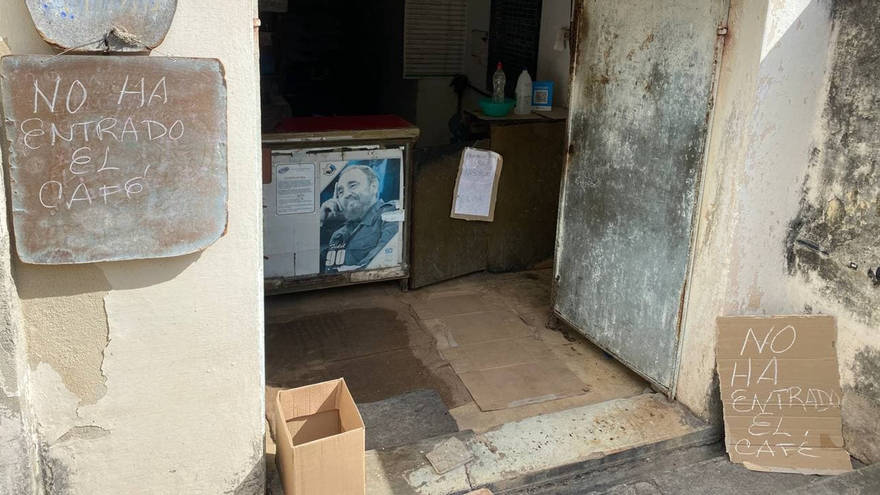
![]() 14ymedio, Luz Escobar, Havana, 11 January 2022 — “No coffee has come in and no coffee has come in.” The clerk at the ration store on E Street between 23rd and 21st, in Havana’s El Vedado district, has chosen to put up two large signs with these words, as she is tired of saying it over and over again to customers who come in asking about the product, while she has no idea when there will be coffee.
14ymedio, Luz Escobar, Havana, 11 January 2022 — “No coffee has come in and no coffee has come in.” The clerk at the ration store on E Street between 23rd and 21st, in Havana’s El Vedado district, has chosen to put up two large signs with these words, as she is tired of saying it over and over again to customers who come in asking about the product, while she has no idea when there will be coffee.
“I put up the signs so that people would be warned,” she says with annoyance, while noting that at the beginning of the year the official press published that the distribution of coffee through the ration book corresponding to January was imminent. “It is not only coffee, there is no compote or milk for children, there are minors who have not had milk since last month,” she adds bluntly.
In another ration store in the same neighborhood, at 27th and A, the picture is the same. “There is no coffee here either,” said the clerk.
Where the product does appear is on the black market, but only now and then. A few blocks from E Street, at the agro-market on 19th and B, this newspaper was able to verify that an informal vendor was offering each package, exactly the same one that is distributed in the family ration basket, at 50 pesos. But residents of the area say that it is not always available in the informal market.
The disappearance of ration-book coffee, and its disappearance in stores that take Cuban pesos or only foreign currency, has coincided with a significant rise in the price of the package that emigrants abroad buy for their families on the island.
Mayra, a resident of Centro Habana, says in a smiling tone that “her mind cannot function without a sip of coffee.” A few days ago, she was forced to ask her daughter, an emigrant in Spain, to buy her a package from one of the online stores.
Her daughter “flatly” refused, she says, because “a 250-gram package of Cubita or any other brand costs more than $20 on these sites.” For example, one of the stores that offers its merchandise on the Cuballama page, managed from Miami, is selling 250 grams (half a pound) of the El Arriero brand for $25.
“Luckily a friend from the neighborhood, who despite living alone in his house has five more relatives who are now living in the United States still listed on his ration book, sold me the six packages that he received from the bodega last month,” explains Sergio, a resident of Cerro. “Thanks to that I still have coffee. He sells me each packet for 40 pesos because otherwise I would have to give up to 60 pesos for one on the black market.”
Brewed coffee is also absent in private coffee shops. “I go all over El Vedado and Central Havana looking for a place to have a snack and, incidentally, have a little cup of coffee and they aren’t selling it anywhere,” says Madelaine, a housewife who decided to go out this Tuesday to do some shopping in the agro-markets. “Even in the cafés they put the price on the board, but all the shop assistants tell me the same thing: ’We don’t have coffee’.”
____________
COLLABORATE WITH OUR WORK: The 14ymedio team is committed to practicing serious journalism that reflects Cuba’s reality in all its depth. Thank you for joining us on this long journey. We invite you to continue supporting us by becoming a member of 14ymedio now. Together we can continue transforming journalism in Cuba.
